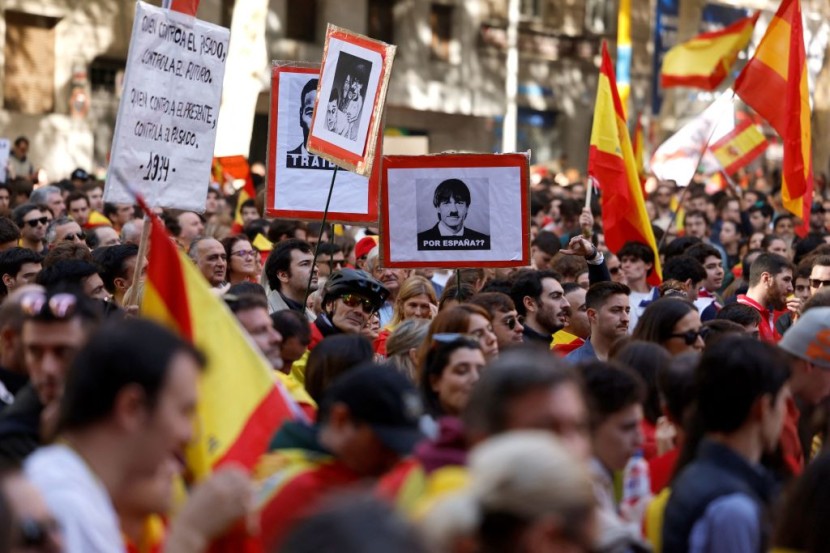Tens of thousands of protesters flooded the streets of 53 cities across Spain on Sunday, expressing their vehement opposition to acting Prime Minister Pedro Sánchez's controversial plan to grant amnesty to Catalan separatists.
The move is seen as a strategic maneuver by Sánchez to secure the parliamentary votes necessary for another term in office, as he faces mounting anger and accusations of compromising the nation's integrity, as per Financial Times.
Accusing Pedro Sánchez of Betrayal, Power Play

The conservative opposition, led by Alberto Núñez Feijóo and Isabel Díaz Ayuso, organized protests in major cities, accusing Sánchez of compromising the nation's rule of law and buying political power through his association with Catalan allies. The proposed amnesty, a deal between Sánchez's Socialist Party and separatists involved in the failed 2017 push for Catalan independence, has become a focal point of discontent, with banners labeling Sánchez a "traitor."
The looming publication of the amnesty law next week has heightened concerns about potential outbreaks of public disorder. While inching Sánchez closer to a majority, the deal is deeply unpopular among the Spanish populace. It has already triggered violent protests, raising the specter of a resurgence in nationalism and empowering far-right factions.
The situation took a darker turn with the shooting of Alejo Vidal-Quadras, a former president of the People's Party and founder of the far-right Vox Party. The assailant, who escaped on a motorcycle, targeted Vidal-Quadras shortly after he voiced his opposition to the amnesty deal and called for continued resistance.
While the motive remains unclear, the incident adds a layer of tension to an already volatile political landscape. The amnesty deal has been criticized, particularly for its potential impact on legal proceedings against prominent Catalan political figures like Carles Puigdemont.
The agreement, designed to cover alleged crimes related to the 2017 independence movement, has sparked debates over the erosion of the rule of law in Spain and the potential transformation of the nation into what some describe as a "totalitarian tyranny," according to The Washington Post.
Read Also: Sullivan Says US Continues Hostage Negotiations; 9 Americans Still Missing
Spain's Amnesty Sparks Judicial Crisis
The controversy has spilled onto the streets and permeated Spain's political and judicial arenas. The General Body of the Judicial Power, Spain's highest judicial authority, has labeled the proposed amnesty as threatening the rule of law, setting the stage for legal challenges.
Meanwhile, the high court in Madrid has expanded its terrorism investigation to include Puigdemont and other Catalan leaders, potentially complicating their legal standing even if the amnesty is enacted.
The unrest has led to violent clashes between police and demonstrators, with the far-right Vox party and the Popular Party supporting the protests. Vox's leader, Santiago Abascal, labeled the amnesty offer as a "coup" against the Spanish state and called for continued resistance.
As Sánchez attempts to navigate these challenges and secure a coalition government with the support of left-wing and separatist parties, the coming weeks are poised to be pivotal. The prime minister faces street protests, political opposition, and judicial hurdles that may impede his plans for a government that hinges on a delicate balance between various factions. The outcome remains uncertain, and Spain stands at a crossroads, grappling with the consequences of a divisive amnesty deal that has ignited deep-seated tensions across the nation, Courthouse News Service reported.
Related Article: Thousands March in France to Oppose Antisemitism








